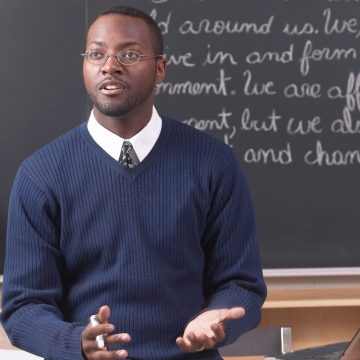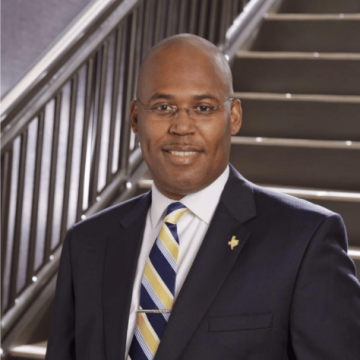By Kathy Quirk
 Martin Haberman, Distinguished Professor Emeritus of Curriculum and Instruction in UWM’s School of Education, discovered his life’s work while standing in a draft board line in New York City waiting to take a 30-word vocabulary test.
Martin Haberman, Distinguished Professor Emeritus of Curriculum and Instruction in UWM’s School of Education, discovered his life’s work while standing in a draft board line in New York City waiting to take a 30-word vocabulary test.
“They had a fancier word for it, but it was basically a vocabulary test,” Haberman says. “If you passed the 30-word vocabulary test, you could stay in college. If you failed it you went into the army and would be very likely to go to Korea, where 58,000 service people were wounded or killed.”
Haberman passed the test the three times he was called up and was able to finish college. Among “the 500 guys standing in line” waiting to be processed and tested, he found that those most likely to fail the vocabulary test were Puerto Ricans, African Americans and poor whites. The experience taught him two valuable lessons: “a sound basic education could save your life; and the fundamental inequities in the American public education system are life threatening. ”
“That experience changed my life”, Haberman says. His goal became to change the education system for the children in poverty in urban schools — those for whom school success was fundamentally a matter of life and death.
He went into teacher education, he says, “because I felt I could have more influence there than as a teacher with no voice or ability to influence policies in highly bureaucratic urban schools or state departments of education.” After earning his master’s and a doctorate in Teacher Education from Teachers College, Columbia University, he came to UWM in 1962. He has been awarded Honorary Doctorates of Humane Letters from Rhode Island College and the State University of New York.
Forty-six years later, Haberman is still working to improve teaching in urban schools. Although he officially retired in May after 43 years on the faculty of the UWM School of Education, Haberman is currently leading a hands-on master’s class for urban teachers, writing, researching, and running a foundation. He says “not much has changed since my official retirement. I’m just getting paid from a different source (the retirement plan).”
Haberman has developed more teacher education programs which have prepared more teachers than anyone in the history of teacher education. The most widely known of his programs was the National Teacher Corps, which was based on an internship program he developed in Milwaukee. He has since written and researched extensively about the factors that make teachers – and their students – successful in urban schools. He has developed a selection interview to guide school districts in hiring teachers who are likely to succeed and stay in urban schools which is used in more than 220 school districts nationally. His latest book (2005) is “Star Teachers of Children in Poverty.”
Haberman summed up his philosophy of teacher preparation in a 2004 article: “For children in poverty, success in school is a matter of life and death, and they need mature people who have a great deal of knowledge about their subject matter, but who can also relate to them. It is also necessary to recognize that most of what effective teachers learn they learn on the job from mentors, colleagues and self-reflection.”
Early in his career in Milwaukee he developed an innovative internship program for liberal arts graduates which caught the attention of the late Wisconsin Sen. Gaylord Nelson and Sen. Ted Kennedy. This became the model for the National Teacher Corps, which eventually prepared 100,000 teachers. “It was a notable failure,” Haberman says in his typical blunt style, “but I learned a lot about what doesn’t work and it made me famous.” And, he adds in a dry aside, “if a program gets a lot of grants and attention nobody ever asks if it really helped kids?” But the Teacher Corps, which ran from 1963-1972, was a learning experience, says Haberman, “and I’m a firm believer in experimenting with teacher education models. We learned a lot about what worked and what didn’t work.”
Building on that early experience and the 40-plus years of research since then, Haberman has developed a significant body of knowledge on the ideology and behavior of effective teachers for diverse children and youth in urban poverty. “The surest and best way to improve the schooling and the lives of the approximately 15 million children and youth in poverty is to get them better teachers,” he says.
In an article in the June 1995 Phi Delta Kappan, Haberman outlined 14 key teaching behaviors that are characteristic of “star” teachers. In the same article he argued that selection is more important than training and that a level of maturity must be reached before teacher training can have value. “Two of the fundamental attributes of successful teachers are maturity and judgment,” says Haberman, “that’s why it’s important to establish programs that bring well-educated college graduates with valuable life and work experience into the classrooms.
“Fundamental belief systems separate star teachers and teachers who burn out and fail in challenging situations,” says Haberman. For example, “some teachers believe some kids learn more than others because they’re smarter. Teachers who believe that might be good at grouping students and marking papers, but are more likely to fail or quit,” says Haberman. “On the other hand, teachers who believe school success is explained by effort are more likely to get their students to succeed. Why? Because they figure out ways to motivate, interest and get them to work harder.”
At UWM and in Milwaukee and Wisconsin, Haberman says, he found such a wonderful laboratory for experimenting with ideas to improve education that he never was tempted to go elsewhere. “I was very fortunate to be at UWM and in Milwaukee. They have also given me the opportunity to try anything I’ve ever wanted. I couldn’t have found a better place. UWM has been an absolute, perfect laboratory. I can say the same for the State Department of Public Instruction in Wisconsin which has accredited every model I ever asked them to let me try.”
The Haberman Educational Foundation works with school systems across the country to screen and interview teachers (principals and superintendents) who will be most likely to stay and be effective with diverse students from poverty backgrounds.
“The number of cities that use my teacher interviews bring in about 30,000 mature adults who will be effective with diverse children in poverty every year.”
“If you estimate the number of children those teachers will reach,” says Haberman, “I’m touching the lives of millions of kids in positive ways…. and that’s a very, very warm feeling.”






